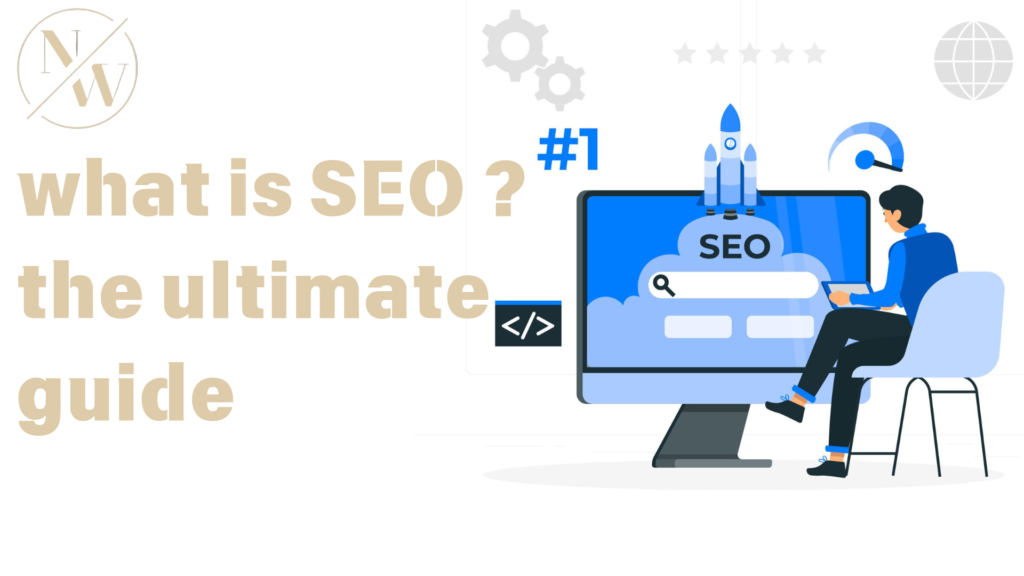What is Seo? Ultimate guide
For companies of all sizes, having a strong online presence is essential in the ultramodern digital world. Search Machine Optimization is one of the stylish strategies to make sure your website stands out( SEO). Search machine optimization( SEO) is the process of making your website more visible and stoner-friendly by perfecting its ranking on hunt machine results runners( SERPs). This companion will simplify SEO into digestible generalities and offer practical advice on how to ameliorate the hunt machine optimization of your website
what is seo?
Search Engine Optimization is known as SEO. It is the process of making changes to your website so that when people search for relevant keywords, it appears higher on search engines. Your site will rank higher in SERPs for better SEO, which will increase traffic and lead to more potential customers.
What Provides SEO Important to Have?
Enhanced Visibility: Being ranked higher puts one in a more visible position, which may result in more traffic.
Credibility and Trust: People tend to view websites with higher rankings as more reliable and credible.
Improved User Experience: Search engine optimization (SEO) entails improving the usability of your website, which improves user experience.
Cost-effective: Unlike paid advertising, organic traffic from SEO is free. Enhanced Visibility: Potential visitors will find your website more easily if it ranks higher on SERPs.
Credibility and Trust: People tend to view websites that rank highly on the first page as being more reliable.
Improved User Experience: Search engine optimization (SEO) improves the content and structure of websites, which benefits users.
SEO Fundamentals
1. Keyword Analysis
The terms users enter into search engines are known as keywords. The first step in developing an SEO strategy is choosing the appropriate keywords.
How to Conduct Research on Keywords
Ideas for Brainstorming: Consider subjects that are pertinent to your company.
Employ Keyword Tools: You can find popular keywords by using tools like Ahrefs, SEMrush, and Google Keyword Planner.
Examine the Competition: Check the keywords that your rivals are ranking for.
2.Page SEO
The components of your website that you can manage and improve are referred to as on-page SEO.
Important Components of On-Page SEO Title Tags: Your main keyword should appear in a title tag that is specific to each page.
Write catchy meta descriptions that make readers want to click and contain your keywords.
Headings (H1, H2, H3): Utilize headings to organize your content and, if necessary, incorporate keywords.
URL Structure: Make sure URLs are rich in keywords, brief, and descriptive.
Content optimization: Make sure your writing is informative, of a high caliber, and contains pertinent keywords.
3.Technical Search Engine Optimization
Technical SEO is the process of making backend changes to your website so that search engines can more effectively crawl and index it.
Technical Tips for SEO
Check the speed at which your website loads. Utilize resources such as Google PageSpeed Insights. to test and improve speed
Mobile-Friendliness: Since a sizable portion of your site’s traffic originates from mobile devices, it should be responsive to mobile browsers.
XML Sitemap: To aid search engines in comprehending the structure of your website, create and submit an XML sitemap.
Search engines can be directed by a robots.txt file as to which pages to ignore and which to crawl.
4. Production of Content
In SEO, content is king. It’s crucial to provide insightful, high-quality content that addresses users’ questions.
Content Types for Blog Posts: Publish pertinent, keyword-rich content on a regular basis.
Infographics: Visual material has the power to engage viewers and draw in backlinks.
Videos: Video content has grown in popularity and has the potential to increase user interaction.
5. Off-Page Search Engine Optimization
Activities that take place off your website and affect your search rankings are known as off-page SEO.
Successful Off-Page SEO Techniques
Building Backlinks: To increase the authority of your website, obtain backlinks from respectable websites.
Social Media Engagement: To improve visibility and increase traffic to your website, interact with your audience on social media.
Guest Blogging: To increase visibility and backlinks, write guest posts on pertinent blogs.

Advanced Methods for SEO
You can explore more sophisticated SEO strategies after you’ve mastered the fundamentals.
1. Regional SEO
It is essential to optimize for local search if you own a local business.
Tips for Local SEO
Google My Business: Make sure your listing is optimized and claim it.
Use local keywords in the meta tags and content of your website.
NAP Uniformity: Make sure that your Name, Address, and Phone number (NAP) are the same on all the website
2. Voice Search Engine Optimization
It’s becoming more and more crucial to optimize for voice search as voice-activated devices proliferate.
Voice Search Advice
Use natural, conversational keywords that people would use when speaking into a device.
FAQ Pages: Make FAQ pages to answer frequently asked questions by your target audience.
3. E-A-T: (knowledge, authority, and reliability)
The E-A-T guidelines from Google are essential for ranking, particularly in YMYL (Your Money Your Life) categories like finance and health.
How to Boost Author Credentials for E-A-T: Emphasize the experience of your content producers.
High-quality content should be published; it should be accurate, thorough, and helpful.
reputable sources Acknowledge credible sources and acquire backlinks from sites with authority.
Assessing the Performance of SEO
You must monitor your progress in order to determine whether your SEO efforts are yielding results.
You must monitor your progress in order to determine whether your SEO efforts are yielding results.
Important KPIs for Tracking Organic Traffic: Keep track of how many visitors arrive from search engines.
Track your rankings for the keywords you want to target.
Bounce Rate: Find out how many people visit your website and then leave after only reading one page.
Conversion Rate: Determine the number of visitors who complete a desired action (such as buying something or filling out a form).
Instruments to Assess SEO
Google Analytics: Offers comprehensive information about the traffic to your website.
You can keep an eye on and manage your website’s visibility in Google search results with the aid of Google Search Console.
SEO Tools: Comprehensive analysis and tracking can be obtained with tools like Ahrefs, SEMrush, and Moz.
Typical SEO Errors to Steer Clear of:
1. Keyword Stuffing
Penalties may result from stuffing your content with too many keywords. Make sure to use keywords in a natural and relevant way.
2. Disregarding mobile optimization
Because so many people use mobile devices, it can be detrimental to your rankings to not optimize for mobile.
3. Ignoring Technical SEO
Your SEO efforts may be hampered if you overlook technical elements like mobile friendliness and site speed.
4. Poor-Grade Content
Publishing thin, low-quality content can hurt your search engine rankings. Always strive to produce valuable, high-quality content.
In summary
SEO is a never-ending process that calls for constant effort and modification. By implementing the tactics described in this guide, you can raise the visibility of your website, draw more users, and eventually accomplish your business objectives. Recall that search edelivering an improved user experience. Remember who is reading your content, and the rankings will come.

